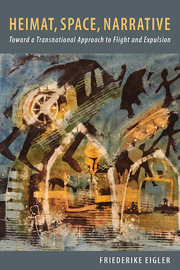Book contents
- Frontmatter
- Dedication
- Contents
- Acknowledgments
- Introduction: Geocritical Approaches to Place-Bound Belonging
- Part I Reassessing the Study of Heimat, Space, and Postwar Expulsion
- Part II Horst Bienek's Novels on Upper Silesia (1975–82)
- 4 Writing, Attachment to Place, and Jewish Expulsion in Bienek's Tetralogy
- 5 Spatial Practices in Bienek's Tetralogy
- Part III Contemporary Novels
- Conclusion: “Lived Spaces” in Literary Narratives
- Filmography
- Works Cited
- Index
5 - Spatial Practices in Bienek's Tetralogy
from Part II - Horst Bienek's Novels on Upper Silesia (1975–82)
Published online by Cambridge University Press: 05 August 2014
- Frontmatter
- Dedication
- Contents
- Acknowledgments
- Introduction: Geocritical Approaches to Place-Bound Belonging
- Part I Reassessing the Study of Heimat, Space, and Postwar Expulsion
- Part II Horst Bienek's Novels on Upper Silesia (1975–82)
- 4 Writing, Attachment to Place, and Jewish Expulsion in Bienek's Tetralogy
- 5 Spatial Practices in Bienek's Tetralogy
- Part III Contemporary Novels
- Conclusion: “Lived Spaces” in Literary Narratives
- Filmography
- Works Cited
- Index
Summary
Adopting a geocritical approach, in the previous chapter I have examined the textual creation of Upper Silesia and the ways in which the author references, incorporates, and transforms existing textual sources—both fictional and non-fictional. Building on this broad geocritical analysis, this chapter focuses on the novels' geopoetics, understood here as the mutually constitutive relationship of space and narrative.
In “Spatial Practices,” de Certeau considers the role of narration for the creation of space, as well as the reverse constellation: “Where stories are disappearing …, there is a loss of space” (123). De Certeau's observation rings true regarding the cultural memory of the former German-Polish border regions: the interest of expellee organizations to discursively control the spaces of the former German homelands is not compatible with stories that traverse particular spaces at a particular time in an open-ended or “delinquent” manner (130). Thus the very organizations that insisted on a “right to homeland” contributed to a loss of stories and to a loss of “lived places” in the collective memory of contemporary Germany and beyond. In an essay with the telling title “Schlesien—aber wo liegt es? Eine polemische Erinnerung” (Silesia, but Where Is It Located? A Polemical Memory), Bienek commented critically on this selective representation of Silesia: “alles affirmativ, alles eng; einfach niedlich” (43; Everything [is] affirmative, everything narrow; simply pretty). The responses to his essay, especially the scathing rebuttal by the “Landsmannschaft der Oberschlesier, e.V., Landesgruppe Hamburg,” signed by many of its members, confirm that Bienek had touched a raw nerve with his essay.
- Type
- Chapter
- Information
- Heimat, Space, NarrativeToward a Transnational Approach to Flight and Expulsion, pp. 103 - 124Publisher: Boydell & BrewerPrint publication year: 2014



